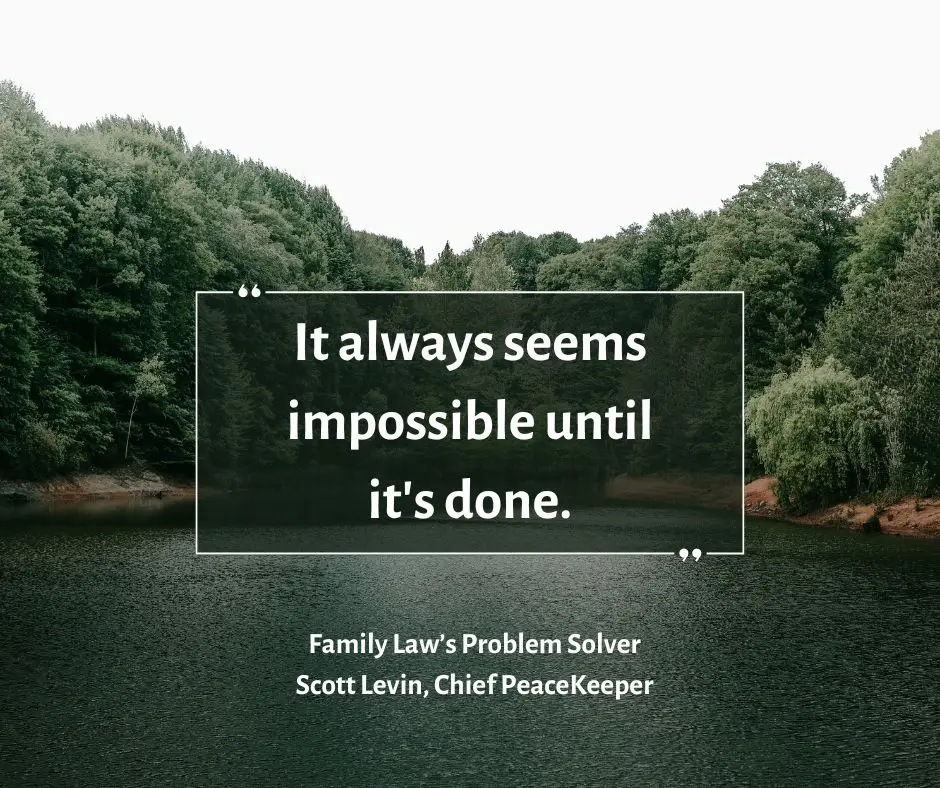As a San Diego divorce mediator, I have seen many couples. They range from those who don’t care to those who care too much. Some couples approach to divorce in a respectful and amicable way; others use the burn-all-bridges and take-no-prisoners approach. Of interest are the people with “high conflict personalities”.
How Divorce Mediation can Alleviate the Stress of a High Conflict Divorce
Divorce Mediation can be a powerful tool for couples facing a high-stress divorce. Mediation provides couples with an opportunity to discuss their issues and reach a mutually beneficial agreement without the need for a long, expensive, and contentious court battle. By utilizing divorce mediation, couples can reduce the emotional and financial toll of a high-conflict divorce. This blog post will explore the many benefits of divorce mediation in a high-stress divorce.
Contact San Diego divorce attorney Scott Levin to learn more about how we help peacefully resolve divorce for couples.
Common Challenges in High Conflict Divorces
High conflict divorces are characterized by a range of unique challenges that can make the process especially difficult. Some common challenges that individuals may experience during a high conflict divorce include intense emotions such as anger, resentment, and bitterness. These emotions can make it challenging to work with a former partner in an amicable manner.
High conflict personalities (HCP) are people who:
- blaming others instead of taking any blame themselves
- see situations as all-or-none with little flexibility
- have unmanaged (unhinged) emotions
- have extreme behaviors that are beyond what is considered socially acceptable
Some examples of HCP include:
Antisocial Personality Disorder (APD); also known as “Sociopath”
People with this condition exhibit some of these symptoms:
- a pervasive pattern of disregard for the rights of other people
- hostility and/or aggression towards other people
- deceitful and manipulative
- take little or no responsibility for their actions
- blames others for “making” their behavior poorly
- endanger themselves with risky behavior
- impulsive behavior with no regard for consequences
- feels no remorse but is capable of feining remorse if it is to their benefit (manipulative)
- above behavior often leads to loss of employment, accidents, legal difficulties, and incarceration
Histrionic Personality Disorder (HPD)
People with this condition exhibit some of these symptoms:
- expresses extreme levels of emotion in situations when strong emotions are not warranted
- behaves in a way that attracts attention, sometimes called “drama queens”
- their life seems to be embroiled in turmoil and “disasters” that befall them
- despite the drama, their interest in the matter is shallow or hollow in comparison
- they are uncomfortable when they are not the center of attention
- they may be flirtatious or seductive for the purpose of gaining attention
- they may dress flamboyantly to attract attention
Borderline Personality Disorder (BPD)
People with this condition exhibit some of these symptoms:
- have mood swings and are uncertain of their role in the world
- have difficulty with controlling anger
- have a black-or-white view of the world
- change their opinion of people somewhat quickly and dramatically
- have difficulty trusting other people
- exhibits impulsive (and sometimes unsafe) behavior, recklessness
- may exhibit self-harm, may have thoughts of suicide
Narcissistic Personality Disorder
People with this condition exhibit some of these symptoms:
- have an exaggerated sense of self-importance
- thinks of themselves as being better than others
- exaggerate about their achievements and abilities
- obsessed with thoughts of success, power, brilliance, and grandeur
- have a strong sense of entitlement
- demands constant admiration and unquestioning compliance
- expects special treatment because of their perceived self worth
- is arrogant
- lacks empathy
- maybe paranoid
Mediating a High-Stress Divorce is more challenging but with the proper guides, a successful outcome is possible.
As a divorce mediator, I see couples blaming one another every day. And to deny the responsibility for their own actions is not new either. However, if I am faced with a high-stress divorce where one or both spouses exhibit high conflict divorce personalities while discussing and negotiating settlement options, I tread carefully and find a way to navigate the couple to a successful divorce. These tips help me take the couple across the finish line.
- I recognize the condition and work with it. I do not try to “fix” them. This is not what divorce mediation is about.
- I avoid triggers that may propel the person into a dark mental or emotional space that is nonproductive.
- I set rules as to what is appropriate and inappropriate behavior. A person with HCP doesn’t like to listen to rules, but I set them nevertheless otherwise, it could descend into chaos.
- Whenever possible, I give the person options so they don’t feel trapped or dictated to.
- I do not emphasize the problems. I focus on solutions and ways to solve problems.
- I avoid drama and don’t give people the chance to spiral out of control.
- I don’t try to convince people what they did wrong and how they can do things better. People with high conflict personalities may not feel remorse, empathy, regret, and may lie (to themselves and to others).
- If possible, I praise the person for the good progress that was achieved. I do this in private so they feel good about themselves and are more willing to continue.
- If possible, I let the person think that the idea was theirs. This makes them feel like they are superior and in control. it might help keep things moving forward.
- I put all agreements in writing so as to avoid a person with HCP backtracking and deny already-resolved issues.
- I avoid revealing any personal information. Some people with high conflict personalities may use the information to manipulate the situation.
- I am cognizant of my own life experiences and experiences of other divorced clients. I avoid being looped into dark places by triggers that an HCP person may exploit.











